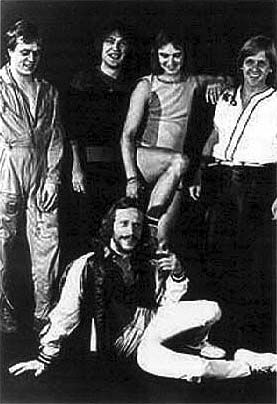
Week of April 25, 2004

Personnel:
Chris Williams - vocals
Hans-Rolf "Charly" Schade - guitar, vocals
Cristoph Barutzky - piano, keyboards, synth
Klaus Kohlhase - bass
Felix Hans
Konstatin Bommarius
Albums:
same (Polydor 2371 215) 1971
Just A Day's Journey Away! (Polydor 2371 270) 1972
Everything You Need (Zebra 2949 002) 1972
Midway (Zebra 2949 013) 1973

Abacus were fronted by the British vocalist Chris Williams, who also
wrote much of their material. “Abacus” was a successful debut album,
recorded August 1971 at the Windrose Studios, Hamburg. It was also released on
Polydor in the UK. It included six songs which were well-arranged and drew
influences from sources as different as classical music ("Capuccino"),
jazz and folk ("Pipedream Revisited", "Song For Brunhilde", "Song
For John And Yoko") and psychedelic blues ("Radbod Blues"). The organ
work of Barutzky dominated their instrumental muscle, but Schade's varied guitar
(sometimes even sitar) work was also remarkable. This first album is often
regarded as their best. With their great sense of humour and versatile musical
style, Abacus can rightly be compared to
Nine Days Wonder.
Their second album, “Just A Day's Journey Away!” (1972), was a competent
follow-up, but this time the group abandoned their versatile progressive style
and concentrated on folk and country. I'm not sure everyone will appreciate
country songs such as "Ballad Of Lucky Luke"! Although "Seasong",
"Munchen 23" and "White House May Come" are good enough, the album
as a whole was less interesting and daring than the previous one. It was
recorded at Music Land Studios, Munich, in June 1972. “Everything You Need”
(1972) was released on Polydor's new Zebra label and introduced former
2066 & Then drummer Konstatin Bommarius as a new
member of the band, replacing Felix Hans. This album was a further move towards
a more simple and commercial style, with four average pop-rock songs on side one
and the "Everything You Need" suite filling up side two. “Midway”
(1973) was another disappointment lacking inspiration. Abacus now had a
song-oriented style with short tracks, in contrast to their promising 1971
debut.
Taken from Cosmic Dreams at Play - A guide to German Progressive and
Electronic Rock by Dag Erik Asbjørnsen, Borderline Productions, ISBN
1-899855-01-7